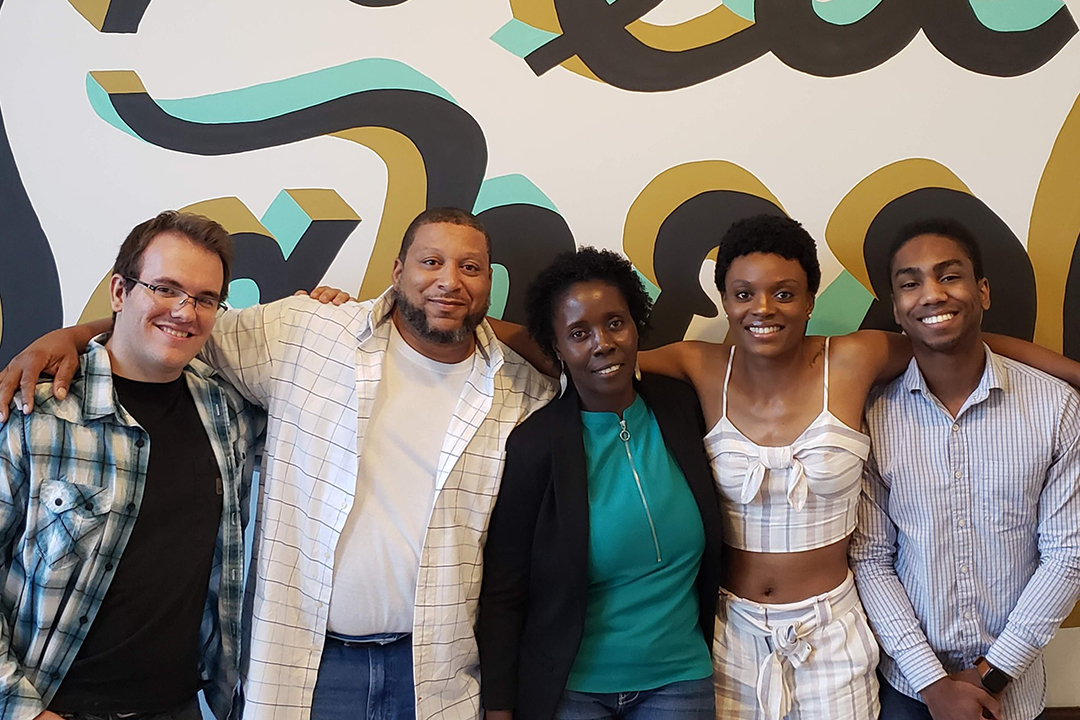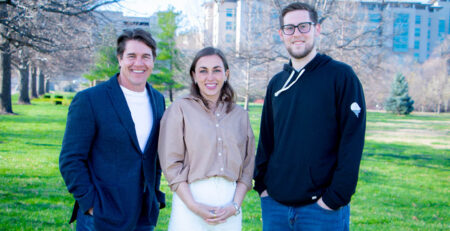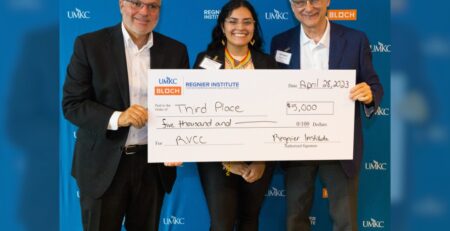Project United Knowledge Lands Grant Funding to Train More Underserved KC Entrepreneurs
Every innovation that solves problems and changes the world starts with one thing: opportunity. But underserved and underestimated groups often never get that opportunity, and the outcomes suggest we all can do more.
In addition to pervasive wealth gaps for Black and Latinx families compared with their white counterparts, professionals from underrepresented groups have less access to financial capital to fund startups, endure more economic stress and often feel less confident with taking the financial risks to pursue entrepreneurship, according to a recent Kapor Center report.
To fill that gap and create more opportunities for everyone to join Kansas City’s expanding entrepreneurial community, the UMKC Innovation Center has recently received a $50,000 investment from the JPMorgan Chase Foundation to help support Project United Knowledge, a Kansas City-based accelerator and incubator, and develop innovative curriculum for new programming. This unified push will help the UMKC Innovation Center and Project United Knowledge build on their prior successes to help even more aspiring entrepreneurs who have early-stage ideas but need the resources to validate their concepts and develop them into full-fledged businesses.
“Entrepreneurs create jobs and grow local economies,” said Nathan Tesmer, Region Manager for the Commercial Bank in Kansas City. “We’re proud to be part of this collaborative effort to empower underserved entrepreneurs and help take them get to the next level while driving inclusive economic growth.”
Dozens of entrepreneurs have already benefited from Project United Knowledge’s existing program; some have created apps, purchased commercial equipment, navigated tricky business licensing and received follow-on funding — key outcomes that wouldn’t be possible without bridging gaps and improving entrepreneurs’ access to business-building resources.
[[CTA]]
“With this generous funding from our partners, we can reach more future entrepreneurs from diverse groups to help them succeed with new opportunities for growth and equip them with highly transferable tech skills and knowledge,” says Quest Moffat, co-founder at Project United Knowledge. “These additional funds can help us reach even more doers, dreamers, innovators and makers in Kansas City.”
This initiative is possible because of a rare partnership from players linked to the corporate space (JP Morgan Chase Foundation), nonprofit and advocacy (Project United Knowledge) and higher education (UMKC Innovation Center).
“This unified effort illustrates the power that combined resources and vision bring to closing the gap for would-be entrepreneurs who have the passion, drive and ability but lack the opportunities to move forward,” says Maria Meyers, executive director of the UMKC Innovation Center.
In addition to being a leader in continuing education in the metro, the Innovation Center is also a link between the Kansas City community, the University of Missouri – Kansas City, corporate partners and KC’s vast ecosystem of entrepreneur resources (including Project United Knowledge) that helps teach and inspire existing and future business owners and connects them to the assistance they need to start, grow and scale their businesses.
Details for the upcoming Project United Knowledge cohort
Throughout 2019 to mid-2020, four Project United Knowledge cohorts will each feature up to 10 aspiring entrepreneurs who have ideas that address problems; the program will show participants the path to providing real-world solutions.
The progressive, modular program has multiple phases and is offered multiple times a year, allowing participants and alumni to jump in or out at any phase so they can test the lessons they’ve learned during the program in the real-world or continue with more Project United Knowledge training to further develop their ideas.
Phase 1 covers business-canvas training to help aspiring entrepreneurs, especially those from disconnected and underestimated communities, vet and test their ideas and build a business case and a business plan. Then, entrepreneurs build directly off that business-canvas training and take their market-tested business concept and learn how to develop it into a product.
In Phase 2, entrepreneurs build out their minimum viable product with startup teams consisting of fellow entrepreneurs, programmers and developers. The goal of this phase is to help entrepreneurs develop a proof-of-concept MVP they can use to build customer traction or use to pitch for potential funding.
This program is open to new and existing business owners in any industry and to those who are exploring a new business idea. Applicants will need a well-articulated description of the product or service they offer (or plan to offer), as well as a description of their target consumer, client or audience.
The first cohort starts Sept. 24, 2019, and culminates in a “Demo Day” during Global Entrepreneurship Week – Kansas City in November. Cost to participants for the first two phases of the program is $350; scholarships are available. Applications will be accepted at the Project United Knowledge website until Sept. 21, 2019.
Additionally, later in 2019, Project United Knowledge, with funding from the Kapor Center, will offer Phase 3, a separate business-focused companion program. It will help existing coders, developers and engineers develop the soft skills necessary to excel in the business world and match them with Project United Knowledge entrepreneurs.
“We want to make sure all participants have the knowledge, tools and experience they need to get their business off the ground,” says Rebecca Dove, curriculum developer at Project United Knowledge. “Sometimes that’s a business plan, sometimes that’s market research, and sometimes that’s an MVP. We just want to make sure they leave the program with something tangible — and that they know where they can get help as they build their business and their skills.”





Leave a Reply